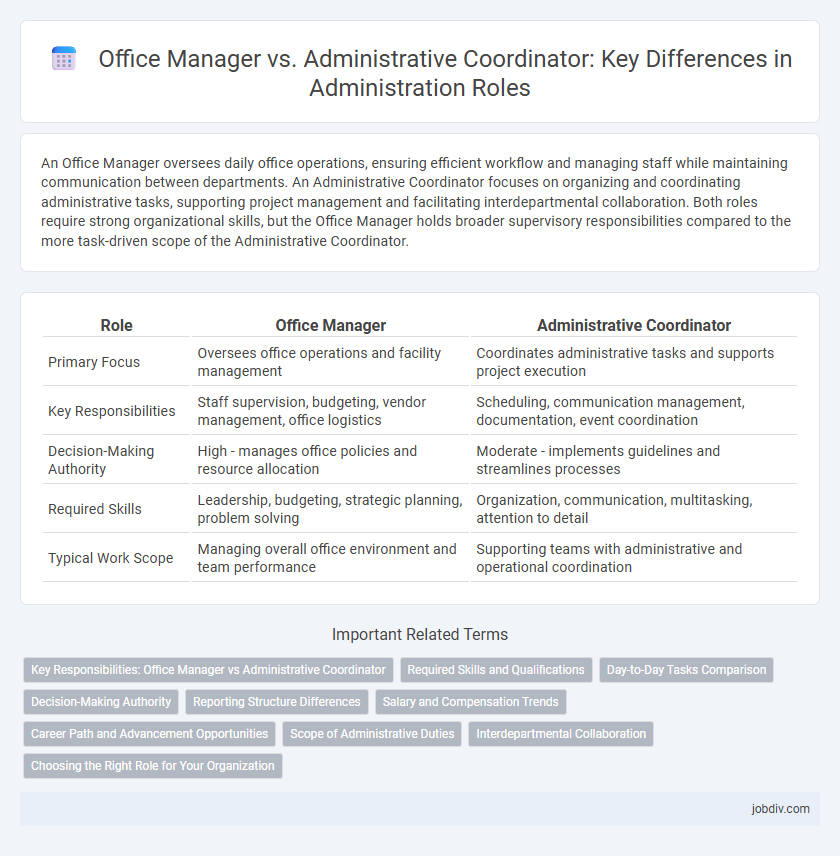An Office Manager oversees daily office operations, ensuring efficient workflow and managing staff while maintaining communication between departments. An Administrative Coordinator focuses on organizing and coordinating administrative tasks, supporting project management and facilitating interdepartmental collaboration. Both roles require strong organizational skills, but the Office Manager holds broader supervisory responsibilities compared to the more task-driven scope of the Administrative Coordinator.
Table of Comparison
| Role | Office Manager | Administrative Coordinator |
|---|---|---|
| Primary Focus | Oversees office operations and facility management | Coordinates administrative tasks and supports project execution |
| Key Responsibilities | Staff supervision, budgeting, vendor management, office logistics | Scheduling, communication management, documentation, event coordination |
| Decision-Making Authority | High - manages office policies and resource allocation | Moderate - implements guidelines and streamlines processes |
| Required Skills | Leadership, budgeting, strategic planning, problem solving | Organization, communication, multitasking, attention to detail |
| Typical Work Scope | Managing overall office environment and team performance | Supporting teams with administrative and operational coordination |
Key Responsibilities: Office Manager vs Administrative Coordinator
Office Managers oversee overall office operations, managing staff, coordinating office activities, budgeting, and maintaining facilities to ensure efficient workflow. Administrative Coordinators focus on organizing schedules, managing communications, supporting project logistics, and facilitating interdepartmental collaboration. While Office Managers handle strategic management and resource allocation, Administrative Coordinators emphasize day-to-day administrative support and task coordination.
Required Skills and Qualifications
Office Managers require strong leadership, organizational abilities, and proficiency in office management software, often with a background in business administration or management. Administrative Coordinators need excellent communication skills, multitasking capabilities, and experience with scheduling and coordinating office activities, usually supported by a certification in office administration or related fields. Both roles demand problem-solving skills, attention to detail, and experience in handling administrative tasks within a corporate environment.
Day-to-Day Tasks Comparison
Office Managers oversee daily operations including staff supervision, office supply management, and budget tracking to ensure smooth workflow. Administrative Coordinators focus on scheduling, coordinating meetings, handling communications, and supporting project management efforts within departments. While Office Managers take a broader managerial role, Administrative Coordinators concentrate on optimizing administrative support and facilitating team cooperation.
Decision-Making Authority
Office Managers hold broader decision-making authority, overseeing daily operations, managing budgets, and implementing office policies. Administrative Coordinators typically handle task-specific decisions, supporting project execution and coordinating team activities under direction. The scope of authority reflects hierarchical differences, with Office Managers responsible for strategic choices and Administrative Coordinators focusing on operational coordination.
Reporting Structure Differences
Office Managers typically report directly to senior management or department heads, overseeing daily office operations and ensuring alignment with organizational goals. Administrative Coordinators often report to a specific project manager or team leader, focusing on coordinating administrative tasks within a narrower scope. This distinction in reporting structure highlights differing levels of authority and operational responsibilities in organizational hierarchies.
Salary and Compensation Trends
Office Managers typically command higher salaries than Administrative Coordinators due to broader responsibilities, with average annual pay ranging from $50,000 to $70,000 compared to $40,000 to $55,000 for coordinators. Compensation trends indicate increasing demand for Office Managers specialized in office operations, driving salary growth by about 5% annually. Benefits packages for Office Managers often include bonuses and profit-sharing, which are less common for Administrative Coordinators.
Career Path and Advancement Opportunities
Office Managers often follow a career path that leads to senior administrative roles or operations management, leveraging extensive experience in office oversight and team leadership. Administrative Coordinators typically advance by specializing in project management or departmental coordination, gaining expertise that can transition into higher administrative or executive assistant positions. Both roles offer pathways to management, with Office Managers generally targeting broader organizational responsibilities while Administrative Coordinators focus on process optimization and cross-departmental collaboration.
Scope of Administrative Duties
An Office Manager typically oversees the entire office environment, managing administrative staff, coordinating office operations, and handling budgetary responsibilities to ensure efficient workflow. In contrast, an Administrative Coordinator focuses more on supporting specific departments or projects by organizing schedules, managing communications, and facilitating information flow between teams. The scope of administrative duties for Office Managers is broader, encompassing strategic planning and resource management, while Administrative Coordinators concentrate on detailed task execution and day-to-day administrative support.
Interdepartmental Collaboration
Office Managers facilitate interdepartmental collaboration by overseeing communication channels and coordinating resources to ensure smooth workflow among teams. Administrative Coordinators manage scheduling and project tracking across departments, streamlining processes to enhance productivity and reduce operational bottlenecks. Both roles are pivotal in promoting efficient information flow and aligning departmental objectives within organizational administration.
Choosing the Right Role for Your Organization
Selecting between an Office Manager and an Administrative Coordinator depends on your organization's specific needs and size. Office Managers typically oversee daily operations, including facility management, staff supervision, and budget coordination, making them ideal for larger teams requiring comprehensive leadership. Administrative Coordinators focus more on streamlining office processes, managing schedules, and supporting project logistics, fitting well in organizations seeking efficient workflow and task-oriented support.
Office Manager vs Administrative Coordinator Infographic

 jobdiv.com
jobdiv.com